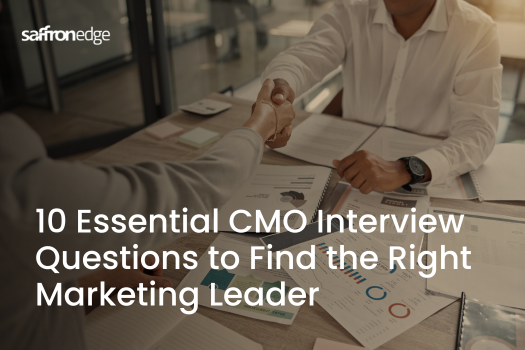Hiring the right Chief Marketing Officer (CMO) for your SaaS startup is a high-stakes decision. The CMO drives growth, builds brand identity, and ensures customer acquisition and retention. But finding the right fit isn’t easy.
Many startups hire based on impressive resumes or past campaigns without considering whether the candidate’s expertise aligns with SaaS-specific challenges.
That’s why the average CMO tenure is over three years—half that of other executives. A great CMO can accelerate your growth, while the wrong hire can lead to wasted resources and missed opportunities.
The key to making the right choice? Asking the right questions. In this post, I’ll share 10 essential interview questions to help you identify a CMO who can take your SaaS business to the next level.
How the Right CMO Can Drive Growth, Branding, and Customer Acquisition?
SaaS marketing is about creating a long-term strategy to build a strong brand, engage customers, and correctly position your product to drive conversions. The right CMO will help you design and execute marketing campaigns and take a holistic approach to growth—balancing customer acquisition with brand-building efforts and customer retention.
I realized early on that marketing isn’t just about what you sell; it’s about how and to whom you sell it. The right CMO will:
Drive Growth: The CMO will strategize customer acquisition and optimize your marketing spending to scale efficiently. They’ll be data-driven, identifying key metrics like Customer Acquisition Cost (CAC) and Lifetime Value (LTV) to ensure your marketing efforts result in sustainable growth.
Shape Your Branding: The CMO will help develop a strong, cohesive brand identity that resonates with your target audience. They will help you stand out in a crowded market through storytelling, brand positioning, and consistent messaging.
Optimize Customer Acquisition: Beyond just driving leads, the CMO should focus on creating customer acquisition strategies that convert high-quality prospects into long-term, loyal customers. They will tailor the strategy to your SaaS model, focusing on nurturing leads through the sales funnel and converting them into paying customers.
When you hire the right CMO, your marketing strategy aligns with your business goals, positioning your SaaS Seo company for long-term success. But how do you find the right one?
10 Key Questions to Ask When Hiring a CMO for Your SaaS Startup
Hiring a Chief Marketing Officer (CMO) for your SaaS startup is critical. The right candidate should deeply understand digital growth strategies, customer acquisition, and brand positioning. Here are ten essential questions to ask during the hiring process:
1. How would you design and implement a marketing strategy for our SaaS company?
This question is essential because it allows you to assess how the candidate would approach a SaaS-specific marketing strategy. SaaS businesses have unique challenges—longer sales cycles, subscription-based models, and a focus on retention. The right candidate should outline a strategic plan that includes customer acquisition tactics and long-term customer retention and growth.
Look for answers that demonstrate a clear understanding of SaaS-specific challenges and opportunities. They should have a plan incorporating content marketing, inbound, SEO, and retention strategies.
2. What marketing channels have you found most effective in customer acquisition for SaaS businesses, and why?
A CMO must know where your target audience is and how to reach them effectively. SaaS companies often rely on a mix of inbound strategies, such as SEO, content marketing, social media, and paid advertising. You want someone who understands the trade-offs between these channels and can prioritize those that will yield the best results for your business.
Look for candidates who back up their answers with examples of success in these channels and who can adapt strategies depending on the startup’s size, target market, and budget.
3. How do you measure the effectiveness of a marketing campaign, and which metrics do you prioritize?
The CMO you hire should understand key performance indicators (KPIs) relevant to your business. Look for candidates familiar with metrics like Customer Acquisition Cost (CAC), Lifetime Value (LTV), and churn rate.
They should also explain how they use these metrics to optimize marketing spend and adjust campaigns in real-time.
Pay attention to how they describe their approach to analyzing data and adjusting tactics based on the results.
4. What role does branding play in the success of a SaaS company, and how would you approach building our brand?
Branding is often overlooked in the early stages of a SaaS business, but it’s a long-term differentiator. A strong brand is essential for standing out in a crowded market.
The CMO should understand the nuances of building a SaaS brand and how to shape its perception in customers' eyes.
Look for answers demonstrating an ability to create a compelling brand story and align that story with your company’s mission and values. They should also have a solid understanding of creating brand awareness and building trust over time.
5. Tell me about a time you led a marketing campaign that didn’t work out as expected. What did you learn from it, and how did you pivot?
A great CMO will have experience working through setbacks and adapting quickly. I asked this question to gauge how candidates handle failure and whether they can use it as a learning opportunity.
The right answer should demonstrate resilience, adaptability, and willingness to take responsibility for mistakes and pivot when necessary.
6. How do you approach customer retention, and what strategies do you use to increase customer lifetime value (LTV)?
In the SaaS world, retention is just as important, if not more important, than acquisition. A CMO must focus on attracting new customers and keeping existing ones happy.
Look for candidates with experience with customer retention strategies, such as personalized marketing, customer support initiatives, and loyalty programs.
Their answers should show that they understand the importance of LTV and how it correlates with customer retention.
7. What marketing tools and technology are you familiar with, and how would you leverage them for our company?
Marketing technology is constantly evolving. SaaS companies often use various tools for automation, data analysis, and customer relationship management (CRM). A good CMO should be well-versed in these tools and know how to leverage them to drive efficiency and improve customer engagement.
Look for candidates familiar with the tools most relevant to your business, such as HubSpot, Salesforce, and Marketo, and who can discuss how they’ve used them to achieve marketing goals in the past.
8. How would you work with cross-functional teams (sales, product, engineering) to ensure marketing strategies are aligned with company objectives?
The success of your marketing strategy doesn’t just depend on the CMO—it also requires close collaboration across departments. The right CMO will understand the importance of aligning marketing strategies with the product roadmap, sales targets, and customer success efforts.
Listen for answers that show a collaborative mindset and an understanding of how marketing can impact every stage of the customer lifecycle.
9. How would you manage a limited marketing budget while ensuring your campaigns' success?
As a startup, you might not have an unlimited marketing budget, so you need a CMO who can prioritize spending and maximize ROI. This question is about understanding how the candidate will balance cost-efficiency with effective marketing.
Look for candidates who are comfortable with lean budgets but still focus on high-impact strategies. They should be able to demonstrate how they've made every marketing dollar count in the past.
10. What is the most important aspect of SaaS marketing that most startups overlook?
This question helps identify whether the candidate truly understands SaaS marketing. Many startups overlook critical elements like customer education, content marketing, or the importance of a strong product-led growth strategy. The ideal CMO should highlight key missed areas and explain why they’re important for long-term success.
Their response will give you insight into their strategic thinking and whether they can identify and capitalize on overlooked opportunities.
Why settle for one CMO when you can have a full team?
From ABM to automation, we help SaaS startups acquire, convert, and retain customers efficiently. Accelerate your growth today!
Get More Than a CMO: Full-Scale Growth Engine
Hiring a CMO is just one piece of the puzzle. At Saffron Edge, we go beyond a single executive by providing a dedicated team of marketing strategists, automation experts, content specialists, and data analysts—all working together to scale your SaaS business.
-
Strategic Expertise Beyond One Person: Get a team of SEO experts, content strategists, and automation specialists instead of relying on a single CMO.
-
AI-Driven Marketing & Automation: Leverage cutting-edge AI tools and automation for lead nurturing, personalization, and conversion optimization.
-
Proven SaaS Growth Strategies: From ABM and demand generation to retention marketing, we implement strategies tailored to your SaaS model.
-
Data-Driven Decision-Making: We track and analyze key SaaS metrics, customer journeys, and market trends to drive continuous growth.
-
Scalable & Cost-Effective: Access a full marketing team at a fraction of the cost of hiring an in-house CMO and team—with better results.
Final Thoughts
Hiring the right CMO for your SaaS startup is a decision that will have a lasting impact on your business. The right person will have the skills, experience, and vision to drive growth, engage customers, and build a strong brand.
By asking these 10 key questions, you can evaluate whether a candidate is the right fit for your startup and whether they have what it takes to lead your marketing efforts to success.
If you are ready to take the next step in scaling your business, consider partnering with Saffron Edge. With our expertise in marketing strategy, customer acquisition, and SaaS growth, we can help you find the perfect marketing leader for your startup. Contact us today to learn how we can accelerate your business’s growth.
Get The SaaS Marketing Toolkit
Frequently Asked Questions
What does a CMO do in a SaaS startup?
A Chief Marketing Officer (CMO) is responsible for leading the overall marketing strategy in a SaaS business. They drive customer acquisition, retention, and brand positioning while working closely with sales, product, and customer success teams to ensure alignment with company goals. A CMO plays a critical role in scaling the business and ensuring that marketing efforts contribute directly to the company's long-term success.
How do I assess if a CMO is the right fit for my SaaS startup?
To assess a CMO’s fit, you must evaluate their understanding of SaaS-specific challenges, such as customer retention and product-driven growth. Ask for specific examples of their past successes and failures, and pay attention to their approach to data-driven decision-making. Also, consider their ability to work collaboratively with other teams and their knowledge of key marketing technologies.
How can a CMO help scale my SaaS business?
A CMO can help scale a SaaS business by creating and executing a robust marketing strategy that drives customer acquisition and improves retention. They will focus on optimizing marketing spend, enhancing brand presence, and leveraging data to ensure measurable results behind every decision. A great CMO collaborates with sales and product teams to align marketing efforts with business objectives.
What are the top skills a CMO should have?
The top skills for a CMO in a SaaS startup include strategic thinking, data analysis, and a deep understanding of digital marketing channels. They should also be excellent communicators who can work cross-functionally, lead a team, and adapt quickly to changes in the market. Experience with SaaS-specific challenges, like subscription models and customer retention, is essential.
How important is customer retention for a SaaS CMO?
Customer retention is one of the most critical responsibilities of a SaaS CMO. Retaining customers reduces churn and increases lifetime value, which is crucial for sustainable growth in a subscription-based business. A CMO should develop strategies that keep customers engaged, satisfied, and loyal over the long term.
More Than a CMO – A Full Growth Team at Your Fingertips
Leverage AI-driven marketing, data-backed strategies, and expert execution to grow your SaaS.
Related Blogs
We explore and publish the latest & most underrated content before it becomes a trend.
9 min read
Top 12 B2B Inbound Marketing Agencies in 2025 for Business Growth
By Sabah Noor8 min read
Online Marketing For Lawyers In 2024: A Complete Guide For Legal Marketing Trends.
By Vibhu Satpaul
Subscribe to Saffron Edge Newsletter!

Get The SaaS Marketing Toolkit










